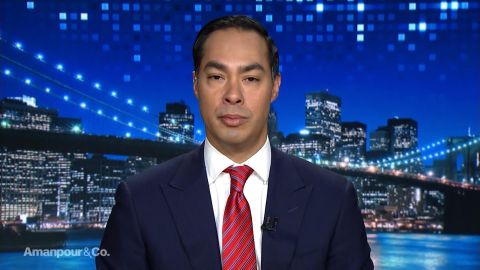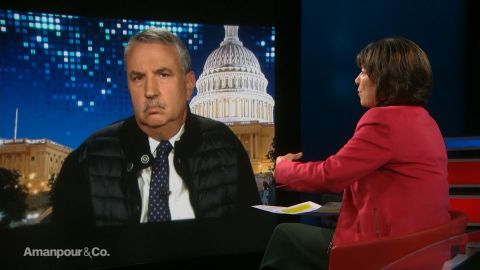Read Transcript EXPAND
ALICIA MENENDEZ: Thanks so much for joining us.
AMANDLA STENBERG, ACTRESS, THE HATE U GIVE: Thank you for having me.
MENENDEZ: Tell me about this film The Hate U Give.
STENBERG: The Hate U Give is based on this book by Angie Thomas. And it’s about this girl named Starr Carter who is code-switching between her two environments. So her neighborhood where she grew up which is predominantly African-American and then her school which is across town and it’s really dominantly white and privileged. And so she’s kind of had to learn how to compartmentalize herself in order to fit into a different environment. And this really traumatic event happens when she’s in her neighborhood with some of her childhood friends and they get pulled over by a white police officer and he gets shot and killed in front of her. And she’s prepared to gravel with being the witness and making the decision to speak up and out for him but at the same time, she has to kind of compromise her safety and confront her identity.
MENENDEZ: Right. A lot of complex questions about race. Let’s watch a clip.
(BEGIN VIDEO CLIP)
CARLOS CARTER: A lot goes to a cop’s mind when it pulls someone over. Especially if they have to get into a contest with the driver about why they stopped them. It’s often an alarm. Are they hiding something? (INAUDIBLE).
STARR CARTER: But you still don’t know if they did anything wrong.
CARTER: That’s why we search them. But if they opened the door or reached to an open window, they’re probably going for a weapon. So if I think I see a gun, I don’t hesitate, I shoot.
CARTER: Because you think you see a gun? You don’t say something first like put your hands up?
CARTER: It depends. Is it night? Can I see? Am I on duty alone?
CARTER: What if you were in a white neighborhood and with a white man wearing a suit, driving a Mercedes? He could be a drug dealer, right?
CARTER: He could.
CARTER: So if you saw him reach into the window and you thought that you saw a gun, would you shoot him or would you say put your hands up?
(END VIDEO CLIP)
MENENDEZ: So there you have Starr talking with her uncle played by Common. He is a police officer and she’s trying to make sense of the role that racist played in the shooting. What did you take away from that scene?
STENBERG: Something that I thought was really compelling about Angie’s writing is that she wasn’t afraid to explore, internalize racism also and how these are internalized notions about ourselves that we often act upon. We don’t even realize it. And so I thought it was cool that she was willing to explore this topic in a nuanced way, in a way that was inclusive of even the perspective of a police officer.
MENENDEZ: How did being a part of this film shaped the way that you think about race?
STENBERG: I think what star-topped me in the process of filming was that there’s nothing inherently wrong with code-switching, that it makes sense the natural human reaction to being placed in those different environments. And with that, you know, you should never compromise who you are.
MENENDEZ: And I think for those of us who grew up in minority communities and then work or later live in predominantly white environments, we’re accustomed in doing that code-switching all the time. When did it first manifest for you?
STENBERG: I think the first time that manifests is when I would witness family members of mine doing it. And I was kind of confused by it as a kid. Like, why is her voice that way then but then when she gets on the phone, it’s someone from work, why is it a completely different voice like coming out of her body? My mom, you know. So I witnessed that first my mom. I also had a really similar experience growing up in a minority community but attending a school that was primarily white. And so probably when I first started going to the school that I went to, I noticed that it was a completely different culture from what I was used to. And that I was alienated and being different because I was one of the only black students, because I was one of the only students that didn’t have that level of privilege that those kids had. And so I felt like I had to adapt a new sort of language to fit in. And I don’t think I was really self-aware about it until later in high school when I realized the ways in which I had been making myself smaller or more accessible in order to appease the people around me. And that’s something that’s really beautiful about Starr’s journey. She kind of reconciles that. She doesn’t need to appease these people. She can just be herself.
MENENDEZ: Who did you start becoming when you were able to pull yourself out of that?
STENBERG: Hopefully, I thought of becoming more of myself. I was less afraid to challenge the institutions. I guess the first step is recognizing the institutions that have made you do what you do growing up. And once I started recognizing, you know, the systems and structures that I was placed within, I was able to then challenge them. Later in high school when there was sort of this first primary wave of online activism, that I was able to find a community outside of my immediate surroundings and recognize that we existed. I was validated by people on the Internet who are having similar experiences all around the country in the world and they inspired me to continue challenging.
MENENDEZ: It occurs to me that Tumblr plays a large role in the film.
STENBERG: It does.
MENENDEZ: And it also plays a large role in your personal story even though people know you as Rue in The Hunger Games. There’s actually a video that you did for school and posted online on Tumblr —
STENBERG: Yes.
MENENDEZ: — that really sort of blew up your star. Can you tell us about it?
STENBERG: Yes, sure. I never could have anticipated that that would be, I don’t know, what would actually lead me later to casting opportunities in Hollywood because I always thought of activism as like kind of the antithesis to Hollywood. I never could have anticipated that we’d be living in a social climate where, you know, being vocal, being yourself would actually help. But yes, I made this video. It was called Don’t Cash Crop My Cornrows for my modern U.S. history class with this really close friend of mine named Quinn Masterson.
(BEGIN VIDEO CLIP)
QUINN MASTERSON: So I’ve been seeing this question a lot on social media and I think it’s really relevant. What would America be like if we loved black people as much as we love black culture?
(END VIDEO CLIP)
STENBERG: And it was just about our tendency in America to commodify black culture while we don’t actually humanize people of color. So it was about fame, style, fashion, sensibility, humor. How we were witnessing it a few years ago really becomes the driving force behind mainstream culture in a way where people who don’t necessarily understand blackness or the experience were kind of snatching it up without respecting the place that it came from.
MENENDEZ: Well, that too manifests itself.
STENBERG: It does.
MENENDEZ: I know that you would be playing (INAUDIBLE). So I wonder, if you watch the film, where can I see your fingerprints on it?
STENBERG: Hopefully, all over it. I got involved in this project really early on so —
MENENDEZ: Before there’s even a script?
STENBERG: Before there was even a script, yes. It was an unpublished manuscript of the book.
MENENDEZ: Which is wild. Like that does not happen.
STENBERG: That doesn’t happen. But — and also it’s like a testament to, you know, what Angie Thomas did. And I was just immediately captivated by it because I felt like I had never seen something that’s so accurately reflected my experience or a lot of black girls’ experience which is if you’re living a contemporary black life, you probably code switch. And there are all these little parallels and things that I can relate to. The producers are really amazed by how parallel my experience was to Starr’s and how much I could potentially bring just seeing from my perspective. So I was there for even the process of scriptwriting. I met with Audrey Wells and we worked on the script together. I would tell her things that I thought like were are authentic or inauthentic. So from the dump, it was all — it was a really collaborative experience. And so I think my touch is all over it. It’s actually because Starr’s been in my heart for so long.
MENENDEZ: If you put one thing away from this film, what do you want it to be?
STENBERG: I think you can take away from the film what you need depending on who you are, what your experience is, what you might need to learn or what you might need to feel validated. I think we specifically made this film for the black community. And Angie made the book for her community too because she knew that the kids in her neighborhood couldn’t read anything where they could see themselves reflected. Within the black community, we don’t necessarily give ourselves the room to emotionally bend or to grieve because of what we’re up against. So hopefully, the movie can be a space for us to do that. And then beyond that, I feel like we want it to be a tool of empathy, a tool to instill empathy in those who have seen these events on TV, on the news, understand that they’re happening but maybe can’t quite understand what it feels like from a really human perspective. And hopefully, through watching the film, they can glean a little bit more about the way in which the media misconstrues us and the way it dehumanizes us. Hopefully, they can feel us in our experience in their hearts.
MENENDEZ: As young as you are, you have been in the industry now a long time. And so I wonder from the advantage point what difference you think Me Too and Time’s Up has made.
STENBERG: I think it’s made a huge difference. I’m seeing a shift in both representations that women are afforded and also representations that people of color are afforded. And I think that that’s in large part due to the Me Too Movement. There’s definitely this really powerful community forming in a way that I haven’t witnessed before and maybe I’ve been too young to witness it. But for the first time, you actually have like the most powerful women of Hollywood getting in the same rooms and saying, “I’m here to support you.” Not just in a public facing way but if you need to talk to your trauma, if you’re feeling unsafe in your work environment, if you feel like you’re being manipulated, you have 30 but also like infinity, you know, women like ready to get behind you and support you in a way that isn’t, you know, just topical. So that’s been really beautiful to witness and it makes me feel safer definitely in pursuing my career.
MENENDEZ: You, in every way, defy labels and expectations. You are young and black and gender non-binary and openly gay. And you act in this movie but then you also, just on the side, write a song like you’re on the soundtrack. I wonder if you’re fame has come because you refuse to be defined by those labels or if it has come despite the fact that you refuse to be defined by those labels.
STENBERG: I don’t know.
MENENDEZ: You’re just doing you?
STENBERG: I’m just doing me at the end of the day. I will say that I am from a generation that is pretty intolerant of misogyny, of racism, of
transphobia. And my fans are excited that I am transparent about who I am.
MENENDEZ: That sounds like a lot of freedom and also sounds like a lot of pressure.
STENBERG: Yes. It’s definitely a catch 22. Sometimes, it’s a balance. I’m still figuring out exactly how I want to share myself, what parts I want to keep really private, and don’t feel like sharing with people. But I also know that I’m not the type of person that would be happy living a dual life, you know.
MENENDEZ: You — especially for a young person, you wield tremendous influence. You’re on the cover of Time Magazine. You have a mega platform at this point. Do you know what you want to do with it?
STENBERG: I want to continue, you know, doing what I have been doing which is just being myself, creating narratives that hopefully can be humanizing and helpful to all kinds of different people in different ways. I want to be a creator myself. I want to be a director. I want to tell stories. And I want to continue to empower my peers.
MENENDEZ: Amandla, thank you so much.
STENBERG: Yes. Thank you.
About This Episode EXPAND
Christiane Amanpour interviews New York Times Foreign Affairs Op-Ed Columnist Thomas Friedman about his support of Crown Prince Mohammed Bin Salman and former Mayor of San Antonio, Texas, Julián Castro about the Democrat’s Latino voting probelm. Alicia Menendez interviews actor and activist Amandla Stenberg, star of “The Hate U Give.”
LEARN MORE


